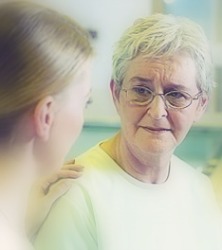Lessons Learned During Sickness
Yvonne Ortega loves to help women move forward from the broken places in their lives, having experienced tough times herself. In this Spiritual Growth UPGRADE, she invites us to  think about how we experience the brokenness of sickness.
think about how we experience the brokenness of sickness.
Yvonne asks, “I hate being sick, don’t you?
"Sickness means I’ll miss events I looked forward to attending. If the doctor says the illness is contagious, I dread it even more."
Going through two years of recurring illnesses, I (Dawn) know what Yvonne means. When we are sick, it's just plain hard. But God brings wisdom in those tough times too!
Yvonne continues . . .
Days of being alone are not my preference. If a cough grips me and makes talking difficult or impossible, that adds to my torture.
One of my friends emailed me, said she’d pray for me to get better soon, and told me to talk to God.
I do that every day in my quiet time. I didn’t need a burning bush experience like Moses had or to be knocked to the ground the way Paul was. I longed for social interaction with my friends in town.
I learned three lessons—or rather had a refresher course in those lessons—during that illness. I offer them to you as tips.
1. I learned to ask for help.
I like to help others, but I don’t like to ask for help.
However, I was too sick to drive to the doctor and the pharmacy. I had to ask a friend for a ride.
I longed for a Green Passion Power Smoothie from Panera, my favorite restaurant. Once again, I had to ask a friend for it. God made me and you as social beings. He made us into the body of Christ.
In 1 Corinthians 12:26, the Bible says, “If one part suffers, every part suffers with it; if one part is honored, every part rejoices with it.”
2. I asked God what He wanted me to do during my sickness.
I sensed He wanted me to listen to a set of mp3s from a conference I had attended. After listening to almost every session and several twice, I asked Him again.
That time, I felt led to take three days as a personal retreat at home. I had planned to go to the beach for a personal retreat, but sickness prevented that trip.
As I rested with my Bible, journal, and pen and listened to praise and worship music, I sensed God’s presence, power, and purpose in allowing me to be sick. I drew closer to him.
James 4:8a says, “Draw near to God, and he will draw near to you.”
That personal retreat blessed me beyond my wildest dreams.
3. I grew in patience.
Patience tops the list when it comes to difficult lessons.
I had hoped to recover overnight.
Unlike instant coffee, instant oatmeal and microwave popcorn, my recovery didn’t happen fast.
James 5:7–8 says, “Be patient, then, brothers and sisters, until the Lord’s coming. See how the farmer waits for the land to yield its valuable crop, patiently waiting for the autumn and spring rains. You too, be patient and stand firm, because the Lord’s coming is near.”
I don’t pray for patience because I don’t want the tests that will follow to help me develop it.
Since I live in an imperfect world with imperfect people, and an imperfect body, opportunities to learn patience will come my way.
I pray I learned the lesson, so I don’t have to repeat the same one.
What will you do the next time you’re sick?
 Yvonne Ortega is a bilingual speaker, author, professional counselor, certified teacher, and speaking coach. She is the author of Moving from Broken to Beautiful® through Grief, Moving from Broken to Beautiful® through Forgiveness, Moving
Yvonne Ortega is a bilingual speaker, author, professional counselor, certified teacher, and speaking coach. She is the author of Moving from Broken to Beautiful® through Grief, Moving from Broken to Beautiful® through Forgiveness, Moving  from Broken to Beautiful: 9 Life Lessons to Help You Move Forward, and Finding Hope for Your Journey through Breast Cancer. Yvonne’s passion is to help women facing life transitions or challenges move from broken to beautiful through God’s Word. Her books are available on her website, www.YvonneOrtega.com
from Broken to Beautiful: 9 Life Lessons to Help You Move Forward, and Finding Hope for Your Journey through Breast Cancer. Yvonne’s passion is to help women facing life transitions or challenges move from broken to beautiful through God’s Word. Her books are available on her website, www.YvonneOrtega.com
Graphic adapted, courtesy of mopje at Pixabay.
 Post a Comment → Posted on
Post a Comment → Posted on  Tuesday, October 24, 2017 at 8:18AM
Tuesday, October 24, 2017 at 8:18AM  Illness,
Illness,  Lessons in Sickness,
Lessons in Sickness,  Sickness,
Sickness,  Suffering,
Suffering,  Upgrade with Dawn,
Upgrade with Dawn,  Yvonne Ortega Upgrade Your Life
Yvonne Ortega Upgrade Your Life  Health,
Health,  Self-Care,
Self-Care,  Spiritual Growth
Spiritual Growth 





